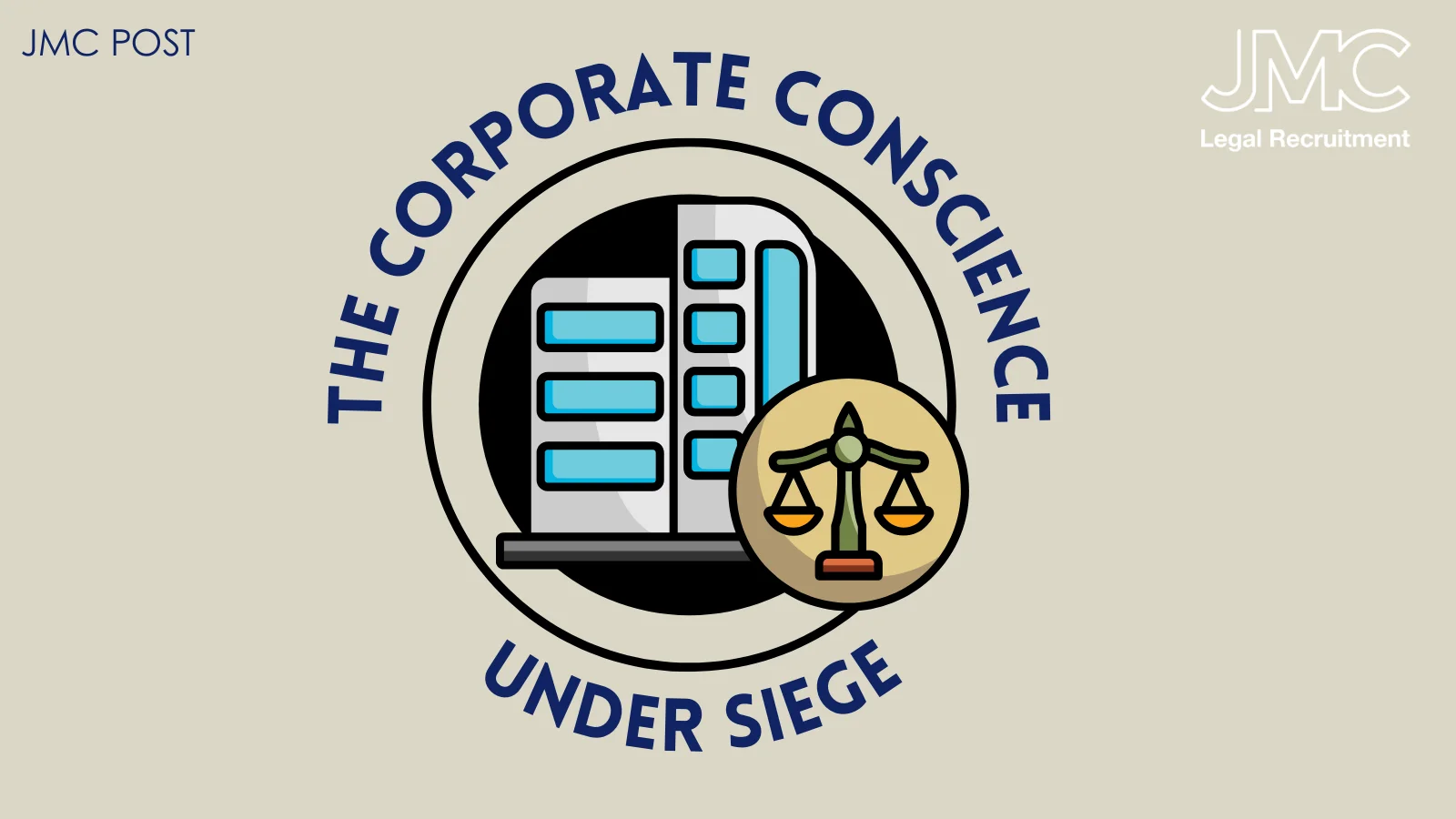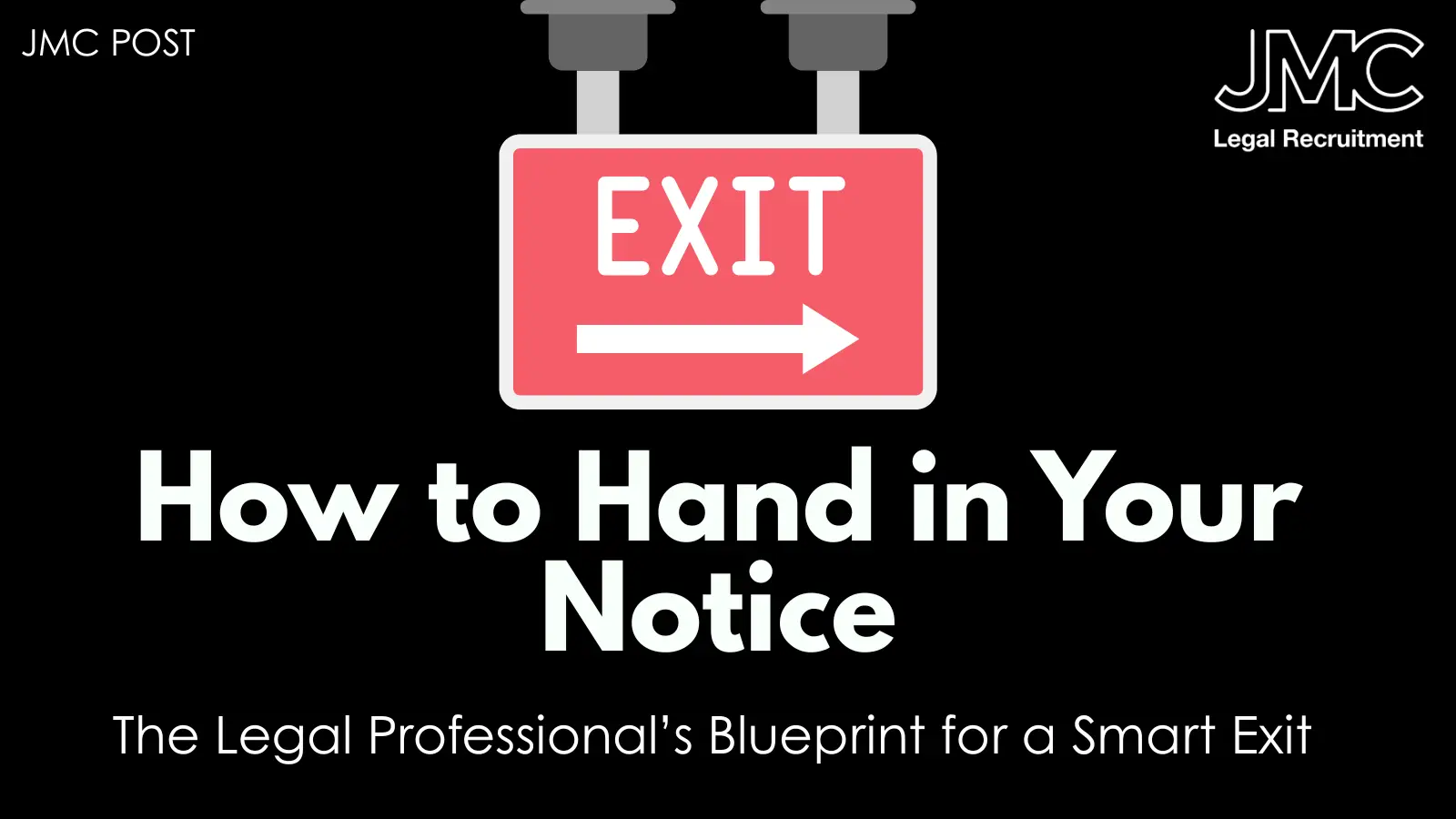
How to Hand in Your Notice
31 Jul, 20255 minutes
How to Hand in Your Notice
The Legal Professional’s Blueprint for a Smart Exit
Every lawyer will face it at some point: the moment you resign from your firm. It’s not just a formality; in the legal world, serving notice is a high-impact move that blends contractual obligations, professional reputation, and career strategy. Yet, clear guidance tailored to our industry is rare.
If you’re standing at this crossroads and ready to open a new chapter, here’s how to exit with confidence, foresight, and class.
1. Recognise the Power of Your Exit
Resigning can be emotionally charged. Whether you’re leaving after six months or six years, it’s a transition that will shape your professional narrative. Exit interviews may be brief, but your departure will echo. A well-managed resignation can boost your standing in a tightly connected legal market. Whether you’re a fresh-faced associate or a seasoned partner, how you leave sets the tone for your next opportunity and influences how your story travels within the market.
2. Review Your Employment Contract in Detail
Before taking any formal steps, revisit your contract. This means:
- Identifying the required notice period
- Understanding any clauses related to PILON (Payment in Lieu of Notice)
- Checking whether the firm reserves the right to place you on gardening leave
Many contracts allow the firm to remove you from client work or the office immediately upon resignation. It’s essential to be prepared. Don’t let contract fine print catch you off guard.
3. Navigate Restrictive Covenants with Caution
Post-termination restrictions are common in legal contracts, especially at senior levels. These may include:
- Non-compete clauses
- Non-solicitation of clients or colleagues
- Non-dealing provisions (even if a client approaches you)
However, many firms draft these too broadly. For a restriction to be enforceable, it must be:
- Reasonable in scope and duration
- Specific and not vague in its language
- Clearly linked to the firm’s legitimate business interests
The courts regularly refuse to uphold covenants that are overly generic or excessively lengthy. Nevertheless, assume enforceability until proper legal advice suggests otherwise. If you’re planning to join a competitor or take clients with you, professional guidance is crucial.
4. Clarify Your Strategic Objectives
Are you aiming to:
- Leave on the best terms possible?
- Take clients with you to a new firm?
- Set up your own legal practice?
Each scenario calls for a different approach. Be absolutely clear about your objectives. When you know your why, it’s easier to avoid impulsive choices and build a smart strategy for your next move.
5. Resign in Person (If Possible)
Whenever possible, resignation should be delivered face-to-face. This is especially important in legal practice where reputation and relationships matter.
Deliver your message professionally, avoid emotional explanations, and keep your reasoning clear and constructive. A follow-up formal resignation letter should summarise the key points. Remember, people recall not just what you said but how you said it.
6. Draft a Clear, Professional Resignation Letter
Your letter should be short and formal:
“Please accept this letter as formal notice of my resignation. I will serve the contractual notice period of [X weeks/months], and I am committed to supporting a smooth transition.”
Avoid expressing grievances or overly personal reflections. Written records can be kept or shared internally.
7. Prepare for a Counter-Offer
It is not uncommon for law firms to respond to resignations with a counter-offer- A raise? A fast-track to promotion? It’s flattering but rarely the fix. Over half who accept counter-offers still leave within 12 months.
Reflect beforehand on how you would respond to a counter-offer. If your reasons for leaving are fundamental, a better salary alone won’t fix them.
8. Maintain Your Professionalism Throughout
Once your notice is served, you’re still on stage. Stay engaged. Support colleagues and finish handovers thoroughly. Resist the urge to coast or vent frustrations. Your final months at a firm leave a lasting impression and will likely influence future references or even re-hires.
Complete your handover thoroughly and cooperate with management to ensure continuity for clients.
9. Take Legal or Specialist Advice
If you have concerns about any aspect of your departure, especially restrictive covenants or bonus clawbacks, seek advice. At JMC Legal Recruitment, we routinely advise lawyers and partners on how to resign strategically while managing contractual risk and protecting future opportunities.
10. Exit with Integrity and Purpose
Your resignation should reflect your values and long-term goals. Law is a reputational industry; how you leave will often matter as much as what you achieved while you were there.
If you’re unsure how to serve notice, concerned about restrictions, or simply want a second opinion on your strategy, speak with a recruiter or legal advisor. It’s not just about leaving, it’s about what you’re stepping into next.
Need Guidance?
Don’t go it alone. At JMC Legal Recruitment, we’re experts at untangling the fine print, managing the politics, and helping legal professionals shape the best possible exit. JMC Legal Recruitment has supported thousands of legal professionals through successful career transitions. From reviewing contracts and restrictive covenants to managing complex team moves and partner-level exits, we bring both insight and discretion to the process.
Ready for your next chapter? Start your search here.
Related Articles:
[Top 10 Interview Questions Law Graduates and Junior Lawyers Should Ask]
[How To Future Proof Your Career]
[The Legal C.V Mistake That's Costing You Interviews]



